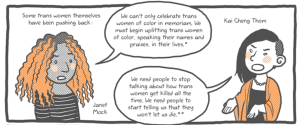
Source: Getty Images
I am not a parenting expert by a long shot.
But really, this isn’t about parenting.
This is about how to practice tolerance and promote feminist principles while running the gauntlet that is the first week of school.
The practice comes from deep feminist roots: Question authority.
I am not suggesting questioning the authority of the teachers, administrators, and staff. Let them do their jobs, and thank them frequently.
Rather, question the authority of the gossip about the teachers, administrators, and staff.
Question the authority of the invisible constructs of good mother as hyper-involved mother luring you to sign up for every PTA/PTO committee.
Question the authority of the collective habit of gossip on the playground telling your child who is and who isn’t anything that others say they are.
Question the authority of gossip.
In fact, approaching the new school year from a perspective of questioning the authority of the gossip constructs held and shared about teachers, other parents, and students can be a powerful exercise in civil disobedience.
When my own children were young, I remember thinking that I had no better source of authority regarding school personnel than the opinions of other mothers. What I have since learned is that it was a reflex, a primal drive to protect my children from my own fears!
I was afraid that they would be physically hurt, intellectually ignored, or systematically dismissed. It felt very real. As if there were a real and inherent threat that without my direct involvement as modeled by other mothers, my children would at best be diminished, at worst destroyed.
This was a symptom of how modern motherhood can feel more hyper-vigilant than empowered.
In seeking knowledge from other mothers, I inadvertently gave them the power of authority, setting me up for old school dualistic thinking: “Mrs. So-and-so is a bad teacher” versus “Everyone loves Mrs. So-and-so.”
Basing opinions about teachers on opinions of parents seemed practical at the time.
In reality, I was caught in the same fear-based double bind created by the institution of motherhood: Be afraid of bad; achieve best. Formula is bad; breast is best. Sleep training bad; family bed best. It goes on and on.
For mothers with school-aged children, the bad/best double bind keeps mothers on guard against bad teachers, bad kids, bad administrators, and bad curricula.
Mothers must also be also on alert for the best teachers, administrators, and curricula in order to aggressively consume that which we are told is best for us.
The ways to question this authority of “besting” begins with this.
1. Don’t Believe the Hype
Question the authority of the hype about your child’s teacher.
Accept your child’s assigned teacher, regardless of what other parents have said about them.
It goes both ways, you know. The teacher with the best reputation can be a dismal failure for your child.
For example, my daughter once got the teacher “everyone loved.” And yet, my daughter’s experience of this teacher was one of disappointment.
If, as parent, I held the gossip-construct of this teacher as universally loved up against my daughter’s direct experience of disappointment, I may have created disequilibrium – crazy-making contradictions between her lived subjective experience and “the group” objectification.
I had to allow her not to follow the habit of social constructs and give her the power to acknowledge full range of her reality, to work within it as a respectful and capable citizen of the classroom.
Conversely, my son had a teacher “everyone hated” and yet thrived throughout the year with no incident. The point is, don’t automatically believe the hype about your child’s teachers. Nothing is as it appears.
A perfect example is the appearance of the teacher.
Teachers are unsuspecting targets for our internalized, yet projected misogyny – like their job isn’t crappy enough. Every aspect of their appearance, intellect, rapport, and tenure is suspect.
I remember scanning classrooms for the “best” display of educational materials. It was more surveillance than support, and stemmed from fear.
Mothers do not feel safe, empowered, or enabled to trust another human being or system of education with our children.
The reason that we don’t trust is rooted in the foundation of patriarchal constructs of division.
Patriarchy keeps us so afraid, distracted, and devalued that we learn to never trust.
If we were to trust teachers and schools to protect and educate our children, we run the risk of being seen as the “uninvolved mother.” For those who haven’t had children, the “uninvolved mother” in modern mommy mythology is akin to other sordid bad girl archetypes like Eve.
You know the drill. Women who question authority and engage their world, transact with it, and embody it authentically are selfish, dangerous, and bring the rest of us pain. Blah, blah, blah.
The construct of the selfish, uninvolved mother is in my opinion, one of the most powerful and pervasive mechanisms of patriarchy today (mostly for privileged white women).
The construct of “empowerment” has created an equally oppressive construct of home or “unschooling.”
Here, fear and anger works to conquer and divide, and it isn’t empowerment. It is patriarchy packaged in “alternative.” This alternative schooling keeps women tethered to children, afraid to trust school systems, isolated, and confined to cultural memes of motherhood.
Many scholars have noted that feminism dropped the ball on motherhood along the way. I tend to agree, with very little exception.
That said, mothers (and parents) can practice feminist principles of authentic knowing, leading, and advocate for less misogyny in schools by dismantling the hype-tool of gossip.
2. Don’t Over-Volunteer
Avoid direct eye contact with the PTA/PTO President. You will be sucked into a vortex of volunteering that is soul-crushing.
I once volunteered 2,000 hours at my kids’ school. I know of what I speak.
Seriously, I needed an intervention.
The double bind of good/bad modern motherhood creates a kneejerk reflex to suddenly throw ourselves at that which represents good – like it is the last one left.
When we see a “good” teacher, particularly for parents in over-crowded public schools, we pounce, and end up signing up to be room parent before we realize it is a part-time job with no pay, no benefits, and no union.
Feminist scholar Sandra Bartky argued that “micropolitics” of daily duties undermine a woman’s power by complicity attaching hetero-messages of pleasure to the kinship projects of day to day family caregiving.
In doing so, women are subordinated by “the duties they are happy to perform and in what they thought were the innocent pleasures of everyday life.”
Sending children the mother messaging that volunteering is both a badge of honor and personally fulfilling is nothing more than marketing.
Extreme-volunteering doesn’t make your kids love you more or make them smarter.
It’s a slippery slope to subjugating your time, attention, creativity, and potentials.
Fight the temptation to fling yourself at every volunteer opportunity thrown in your kid’s back pack.
Selling your soul to calm your fears serves no one, except the advertisers convincing you that buying their products will make you a better mother.
3. Don’t Buy the Hype
Speaking of selling, don’t buy the products of hype telling you what you need.
Women’s purchasing power has significance to the global economy. The good/bad paradox bites us in the ass here, too.
Part of bending women to the power of corporate greed is in directly marketing to our guilt through incessant bifurcation of the Bad Mommy/Good Mommy complex.
Note the double bind in labeling the next time you shop for school supplies or lunches.
Organic, natural, fresh, healthy, eco-friendly labels are pitted against the gender specific color schemes on tubes of yogurt. This is old-school patriarchy shaping our economic power through methodical micro management of imagery and the symbolism associated with that imagery.
It also grooms our children for the best/worst cha-cha that awaits them when they have money.
Question the authority of end caps at telling you to buy jumbo packs of glue sticks. They dry out in a week anyway.
4. Don’t Engage in Self-Loathing and Misogyny
When you hear words of self-loathing and misogyny from other parents, don’t engage.
As I am writing this, I am reflecting on just how hard this can be. “How was your summer?” “Great, how was yours?” for me is an exercise in dissociation.
I go on autopilot to squeak through drop-off without overhearing the back-biting bitch fest happening by the ball box.
Truth has nothing to do with this phenomenon. The Truth of our transactional and ontological embodiment of the emotional, intellectual, creative, spiritual and yes, maternal experience of bringing our children to their school has no language that connects us with one another.
The small talk that women have with which to socialize with one another on the school yard is language of comparison and complaint, not connectivity or co-constitutive relationship.
It is men’s language. The language of patriarchy, to place word to value, syllable to symbol, does not translate the experience of walking away from your child on his/her first day of school.
No matter what grade they are in, that initial walk away is an intimate experience with separation of self and other, I/Thou (Buber), Object/Subject.
Women don’t just leave our kids at school, we leave our freaking cells – the forensic evidence of our most intimate relationship lines up when the bell rings and walks away from us.
Ouch. Good ouch. Real ouch.
In that moment, we are raw and deeply engaged in an experience unique to women.
To then engage in the habits of patterned responses between other moms, only to hear language that has nothing to do with respecting women’s experience, adds insult to injury.
So avoid the coven. You might have fewer friends at your kids’ school, but honestly, they would only bring you more suffering as you try to squeeze yourself into what “other moms” look and sound like.
5. Tell Other Parents That You Don’t Gossip
If you are really up for a walk on the wild side of feminist parenting, try being the question of authority by telling parents you don’t gossip.
Again, it’s not a way to be invited to the Oprah’s book club, but it is incredibly effective in stopping the habit of hatred. Once moms stop looking at you like your head is on fire, they begin to know you are the real deal.
I am not invited to the book club, or girl’s night out.
I am however, heartened by the frequency with which other mothers reach out in private and meaningful ways. The telephone calls out of nowhere when the shit hits the fan. The nearest Planned Parenthood, divorce attorney, domestic violence hotline, therapist, shrink.
I get those calls. And I take them to the grave.
I see these same women in the coven in the morning and smile knowingly, knowing that we have shared sisterhood.
Holding the line against misogyny socially translates to authenticity privately.
—
Constructs of patriarchy arise internally and appear externally every day.
For women who are mothers, the back-to-school slam dance can be an opportunity to allow the rigid boundaries of good and bad to loosen.
Questioning the authority of constructs of good/bad motherhood requires an ongoing critical reflection of how we are in the world, and how we are with the world.
Glue sticks not required.
Want to discuss this further? Login to our online forum and start a post! If you’re not already registered as a forum user, please register first here.
Walker Karraa, PhDc is a doctoral candidate at Sofia University, where she is finishing her dissertation study of the transformational dimensions of postpartum depression. Walker was the founding President of PATTCh, an organization founded by Penny Simkin dedicated to the prevention and treatment of traumatic childbirth. Walker is the perinatal mental health contributor for Lamaze International’s Science and Sensibility, Giving Birth With Confidence, and the American College of Nurse-Midwives (ACNM) Midwives Connection. She is co-authoring a book with Kathleen Kendall-Tackett, Ph.D., IBCLC, FAPA on PTSD following childbirth. Walker is a 10 year breast cancer survivor, and lives in Sherman Oaks, CA with her two children and husband.
Search our 3000+ articles!
Read our articles about:
Our online racial justice training
Used by hundreds of universities, non-profits, and businesses.
Click to learn more




















